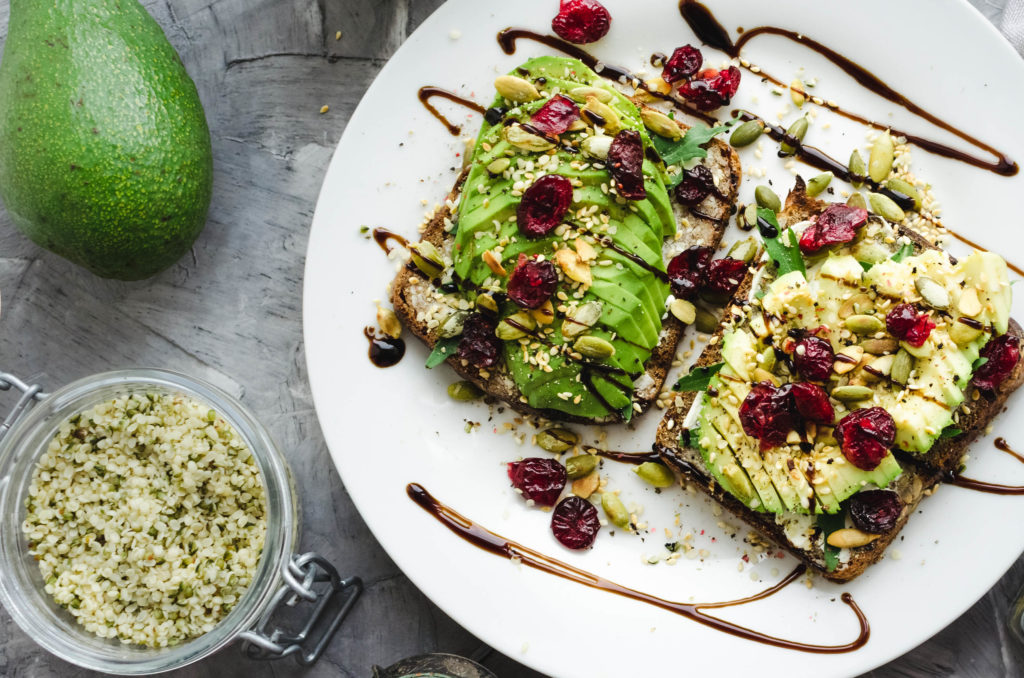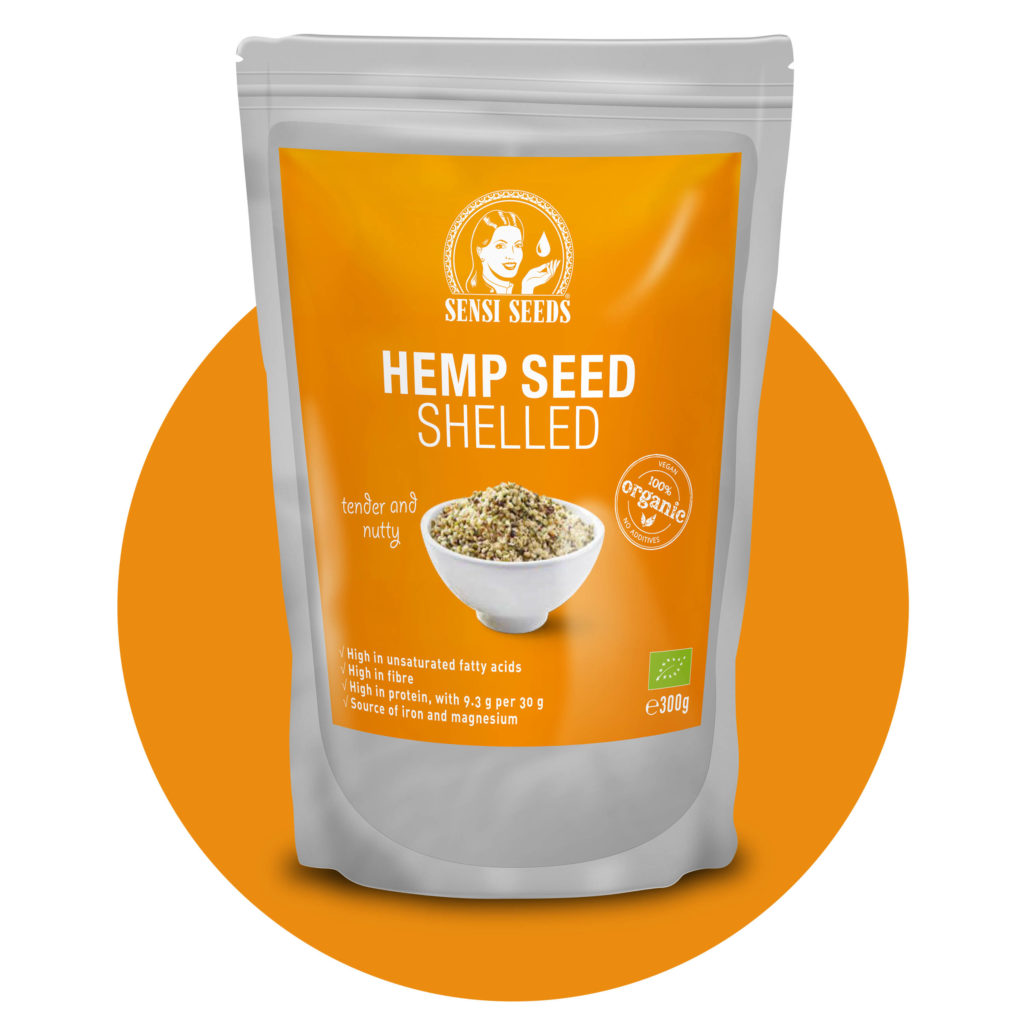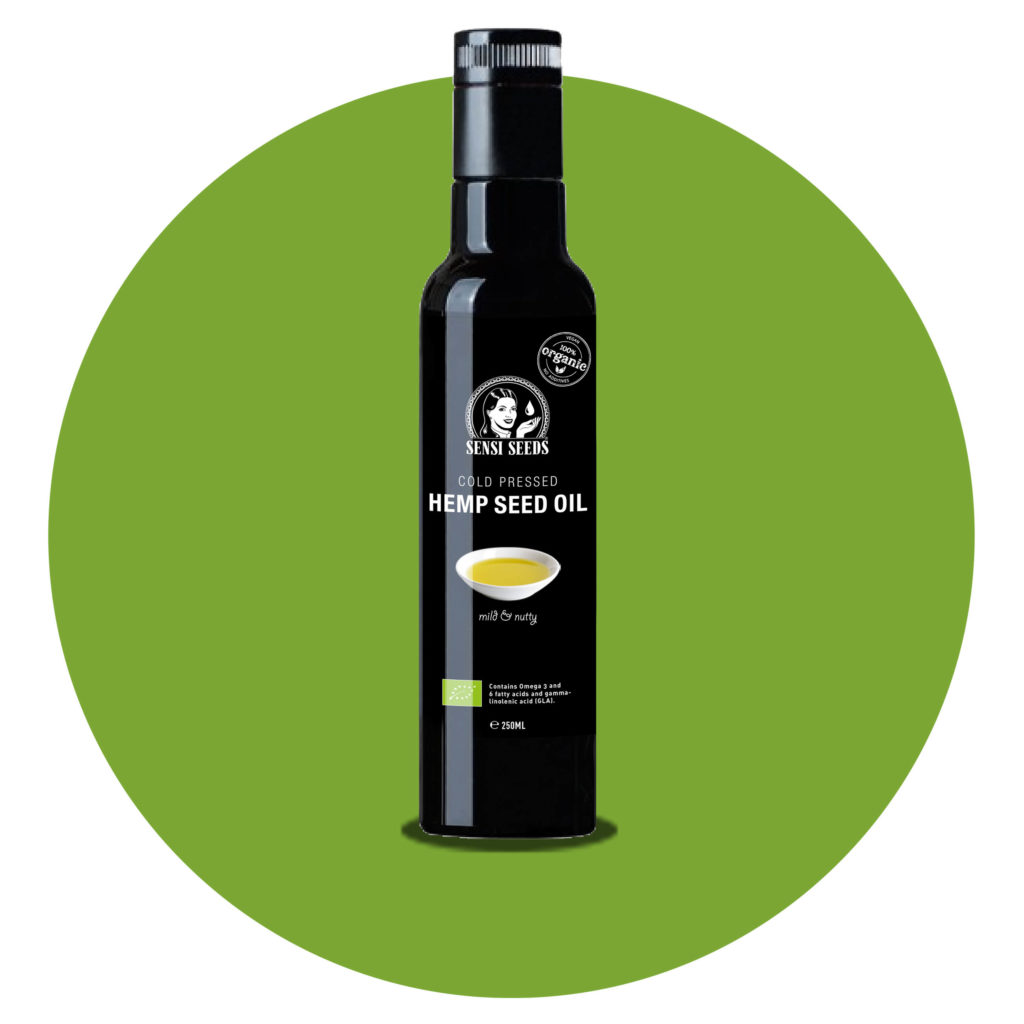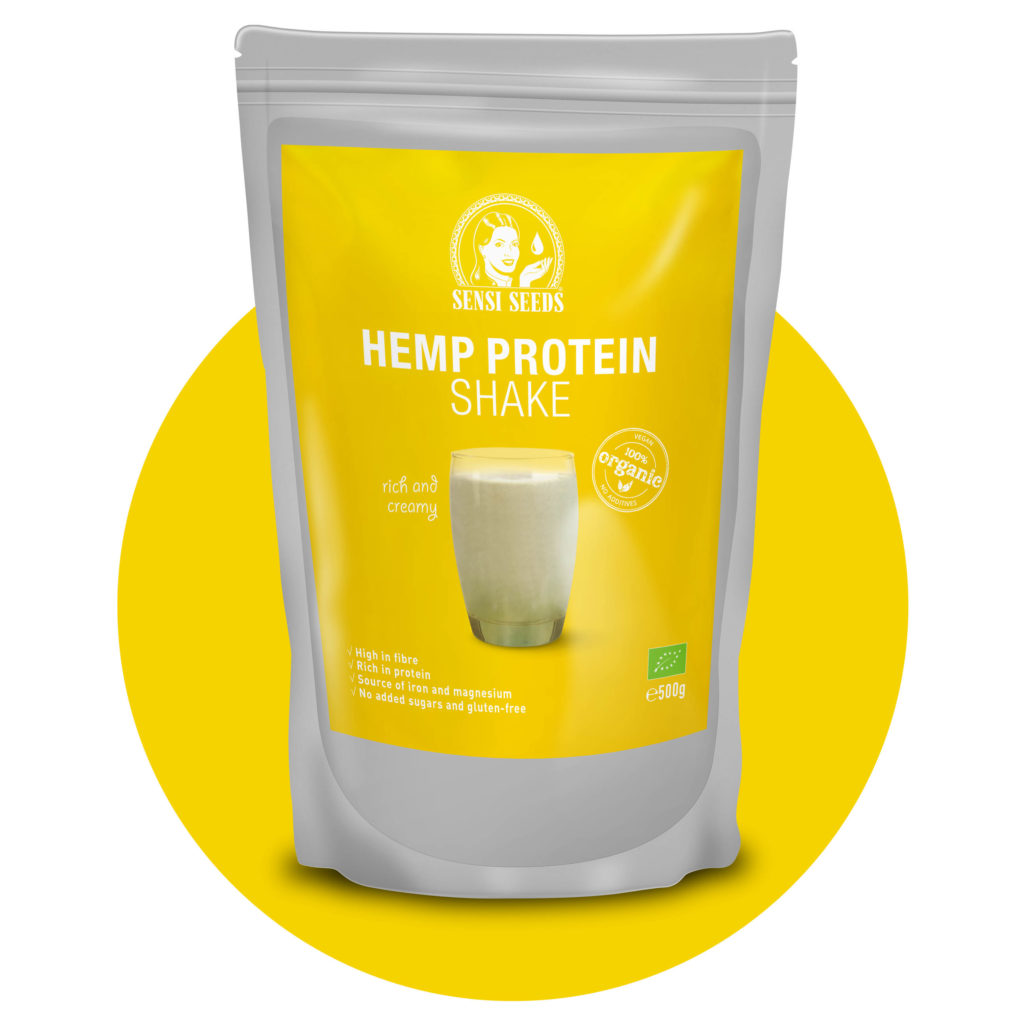Protein is essential for human health, and should be eaten every day. The body doesn’t synthesise all the proteins required for cellular function and maintenance, and that’s why it is essential to consume proteins as part of your diet. Here are 8 reasons why hemp seed is the best protein source!
Protein is essential for health because it is composed of chains of amino acids, which are essentially the building blocks of proteins. Amino acids provide the components for haemoglobin (which carries oxygen in the blood), antibodies to fight infection, a large number of hormones, and enzymes which enable all the chemical reactions inside cells. They form foundational structures for cell function such as receptors, cell structure and cell motility.
Unlike fats and sugars, proteins are not stored by the human body, but are rather used up in cellular processes. If we do not get the required amount of protein each day, our bodies will actually break down muscle tissue to make up the shortfall. Now we know why it is so important, let us look at why hemp seed is such a valuable protein source.
1. Hemp seed contains all nine essential amino acids
Of the twenty amino acids we need, nine are classed as ‘essential’. These are the ones our bodies cannot synthesise from other amino acids and metabolic processes. This is why they must be consumed as part of our diet. Hemp seed contains significant amounts of all nine essential amino acids, making it the perfect way to ensure your body is getting the right nutrition on a daily basis.
2. Hemp seed contains more useable protein per gram than almost all other foods
Hemp seed contains 25 grams of protein per 100 grams. This is higher than all other plant sources, and higher than or equivalent to almost all meat and fish. On paper, soy appears to out-perform hemp as a protein source in a few ways.
So, hemp seed is 25% protein, whereas soy is 32%. Soy also contains slightly higher levels of eight out of the nine essential amino acids. However, it is important to look at how much of this protein can actually be used by the body. Soy, unlike hemp seed, contains high levels of trypsin inhibitors (see below) which prevent all of its protein and essential amino acids being absorbed by the body.
3. Hemp seed does not contain trypsin inhibitors
Trypsin is a digestive enzyme which is secreted by the pancreas as trypsinogen. The essential function of trypsin is to break down proteins in the small intestine so that the body can use all the available amino acids and other nutrients it contains.
Trypsin inhibitors block the function of this enzyme, so less protein is broken down and digested. Hemp seed is rare among food protein sources in that it does not contain trypsin inhibitors, so all of the protein and essential amino acids it contains are available to the body. Meat, nuts, soy, lima beans and raw egg white all contain trypsin inhibitors.
4. Hemp seed contains easily digestible protein
Not all foods contain easily digestible protein. Nuts and legumes contain phytic acid, which may render certain proteins in the same foods indigestible. It also blocks the absorption of zinc and iron, which are also essential for good health (and found in hemp seed!).
Beans, though good sources of protein, contain saponins, which are a form of antinutrient much like phytic acid. They, too, can interfere with nutrient transport and protein digestion. All in all, hemp seed – which contains edestin and albumin, two high-quality proteins – is unquestionably one of the easiest proteins to digest.

5. Hemp seed contains the perfect 2.5:1 balance of essential fatty acids
Hemp seed and hemp seed oil are generous sources of the essential fatty acids linoleic acid, commonly known as omega-6, and alpha-linoleic acid, also called omega-3. As with the essential amino acids mentioned above, they are classified as ‘essential’ because they are indispensable for heath, yet cannot be created by the human body and must be a part of our diet.
Just as essential as these fatty acids themselves is the ratio in which they are consumed, since proper absorption and use of both depends on this. An excess of omega-6 can actually cause serious health problems.
It is hypothesized that during evolution, humans went from consuming a 1:1 ratio of omega-6:omega-3 to a ratio of 20:1. This is an unhealthily high ratio of omega-6 and increases the risk of obesity. It is now known that between 2:1 and 3:1 is the most beneficial balance. Interestingly, this is the balance usually found in traditional diets in Japan and the Mediterranean, both places with a historically low rate of heart disease. Hemp seed has a ratio of around 2.5:1, making it the ideal balance. For comparison, soy has a 7:1 ratio.
6. Hemp seed farming is beneficial to the environment
Much has been written about the benefits of farming hemp: it requires less water, fertilizers and pesticides than other food crops. It improves the soil for the following crops instead of depleting it, and it can lock in large amounts of carbon both while growing and when used in products for the building and textile industry.
The meat farming industry, on the other hand, is both environmentally destructive and causes extremely high carbon emissions. In this paper titled “Global Warming: Role of Livestock”, authors attribute 14% of the world’s greenhouse gas emissions to livestock farming. Modern research calls for a radical change in farming practices, and hemp fits the need for a high-protein crop perfectly.
7. Hemp seed is free of contaminants and additives
Processed foods, especially meat, are treated and packaged to make them look attractive. This usually involves the addition of preservatives, flavour enhancers and bulking agents that are not visible to the naked eye, but which can have adverse effects on the body. There is also a perceived lack of transparency in the meat production chain, meaning consumers often don’t know that additives were ever used on their meat or the safety of those additives.
Hemp seed and hemp oil are advantageous in that what you see is what you get! That doesn’t mean unethical farming practices don’t take place when it comes to hemp, as industrial contaminants can make it into hemp seed. However, hemp seeds do not require preservatives or processing in order to be packaged and sold. This means hemp seeds almost never contain additives, and it is much less likely that they contain contaminants.
8. Hemp seed is really easy to add to any diet
A factor that dissuades many people from making dietary changes is the inconvenience of long preparation times or having to add elaborate new recipes to their already busy schedules. As a health food, hemp seed is exceptional in that it needs no preparation! It is best to consume it raw, as many of the proteins can be denatured at high temperatures. This makes it ideal to add to salads and cereals. However, if it is added to warm dishes just before serving, all its nutritional properties are preserved.
Together with its very subtle, neutral, nutty flavour, this makes it incredibly easy to incorporate into your existing diet. This is as true for mainstream diets as it is for specific ones. For example, it can be added to baked beans, mashed potato, pasta sauce, soups and stews. Hemp seed is perfect whether your diet is vegetarian, vegan, gluten-free, Paleo, lactose-free, sugar-free, macrobiotic or raw food.
How to add hemp to your diet
There are multiple different ways that you can add hemp seeds to your diet. Let’s have a look at some of the different ways:

Shelled hemp seeds
The first and most obvious way is to use shelled hemp seeds directly out of the bag. They can be sprinkled on salads, cereals, yogurt or oatmeal. They can be added to smoothies to provide some texture, or they can even be added to trail mixes. They have a nutty flavour and fit in perfectly with other nuts or superfood concoctions. Sensi Seeds produces Shelled Hemp Seeds that are the perfect addition to your next meal.

Hemp seed oil
Hemp seeds can also be pressed to produce hemp seed oil. Sensi Seeds’ Hemp Foods Hemp Seed Oil is organic and cold-pressed, and should also be a staple in the pantry. It has the same nutty flavour as hemp seeds, only it can be drizzled as a dressing for a salad, used to cook, or can be used as a base for your next pesto!

Hemp protein shake
Sensi Seeds has innovated a delicious, creamy Hemp Protein Shake. It is best consumed in the morning as a succulent boost to get your day started. It is also a great post-workout protein shake or as a hemp boost during a hard day of work or sporting activities. Enjoy alone or complemented with fresh fruits for a delicious, reinvigorating protein smoothie.
Other parts of the hemp plant you can add to your diet
Hemp is one of the most versatile plants on the planet, not just for the number of different uses that it has, but for how many parts of the plant can be used. Hemp seeds are not the only part of the hemp plant beneficial to the human body or diet. The flowers and leaves are also rich with nutritional material that you can benefit from.
Hemp leaves
Hemp leaves are rich with proteins, cannabinoids, terpenes and flavonoids. These compounds have a wide range of applications, including being antioxidant and anti-inflammatory. Leaves can be sprinkled on a salad or even added to a sandwich!
Hemp flowers
Hemp flowers are best added to the diet fresh off the plant. They can be juiced and consumed alone or added to other superfood juices. Cannabinoids in their acidic form are better absorbed by the body and are more bioavailable than decarboxylated cannabinoids. Raw hemp flowers contain acidic cannabinoids. It does take a lot of hemp flowers to make juice, so it’s best if you have your own plants at home!
How do you add hemp to your diet? We would love to hear about it! Leave your suggestions for hemp-enriched food in the comments below.
- Disclaimer:This article is not a substitute for professional medical advice, diagnosis, or treatment. Always consult with your doctor or other licensed medical professional. Do not delay seeking medical advice or disregard medical advice due to something you have read on this website.












What a fun read – I’ll be sharing with my husband. This is appreciated!
I cannot go a day without my asteroid gummies!
This article is very helpful for people like me who are in the diet, I didn’t know that are hemp seeds full of protein until I saw these article.
Love to read this article!! I have also experienced Hemp Seed Powder, it’s really beneficial and help to improve our immunity.
Great article, I have been looking for a resource for Hemp.
I’ve never seen this much good information.
I’m in the USA. THEY , feds don’t get it. 2 completely different plants. They see. It as one.
Hey I wrote about the hemp seed oil. I for got to mention about my left eye. I couldn’t read the last line on the chart. After taking hemp seed oil twice a day for 3 months. I can read that bottom line on the eye chart.
Doctors here don’t believe it’s the oil. It is
Hi John.
Very good information. Everyone heads for CBD. They don’t have a clue as to how well hemp seed oil or heats work for pain.
3 months ago. I started taking hemp seed oil. No idea what to expect.
For starters my 1st Nutiva 24oz bottle. I stopped taking my daily arthritis pain killer.
I’m amazed. Pain relief from just hemp seed oil.
2 months ago I was on Lipitor. Doc saw plaque in my eye. A line, it was. A month later I quit Lipitor. I had to many side effects!! Including a small stoke in my eye. So I had the plaque with one blood spot and another spot. 3 things in my eye. A month went by and had 3rd eye exam. All 3 spots were slowly disapearing!!!!! Ive been taking the hemp seed oil 1 to 3tbl a day. Hemp hearts too. Had 2 oz of CBD. Cost to much. Id rather have the seed oil n hearts. Got some hemp protein. That’s a little tricky for me. I don’t make smoothy.
Any ways non-cbd. Hemp is working for me. Doc said see u I’m 2 months. He totally didn’t believe hemp seed oil was working on my eye spots.
The Lipitor put the 2 spots there. The plaque was there before I even started the hemp seed oil. The plaque was in my line on vision. That’s why I went in. Not to mention I had a boat load of tests at hospital. High cholesterol. Not diabetic. Corotied artery, EKG, echocardiogram all Normal.
So it’s all points to hemp oil.
But doctors can’t see that.
“Protein from eggs becomes difficult to digest if they are boiled”
What!? It’s opposite. Protein from boiled eggs are twice better digest then raw.
Your place is valuable for me. Thanks!
Can you vape hemp seed oil
Hi Mike,
The short answer is ‘no’, but here’s an article which explains the differences between CBD oil, CBD e-liquid (which can be vaped) and hemp oil, to help you understand why 🙂
With best wishes,
Scarlet
Very good article. The only comment I have is about #8. Hemp is a bioaccumulator, so if it’s grown with herbicides, insecticides or chemical fertilizers it will accumulate toxins.
Hi John,
Thank you for your comment. I agree that this could be a concern, although hemp grows so well without herbicides, insecticides or chemical fertilizers that it is unlikely that these substances have been used. It is always preferable to buy organic hempseed, however any food grade hempseed has to comply with the standards set for foods so toxins should not be present.
With best wishes,
Scarlet